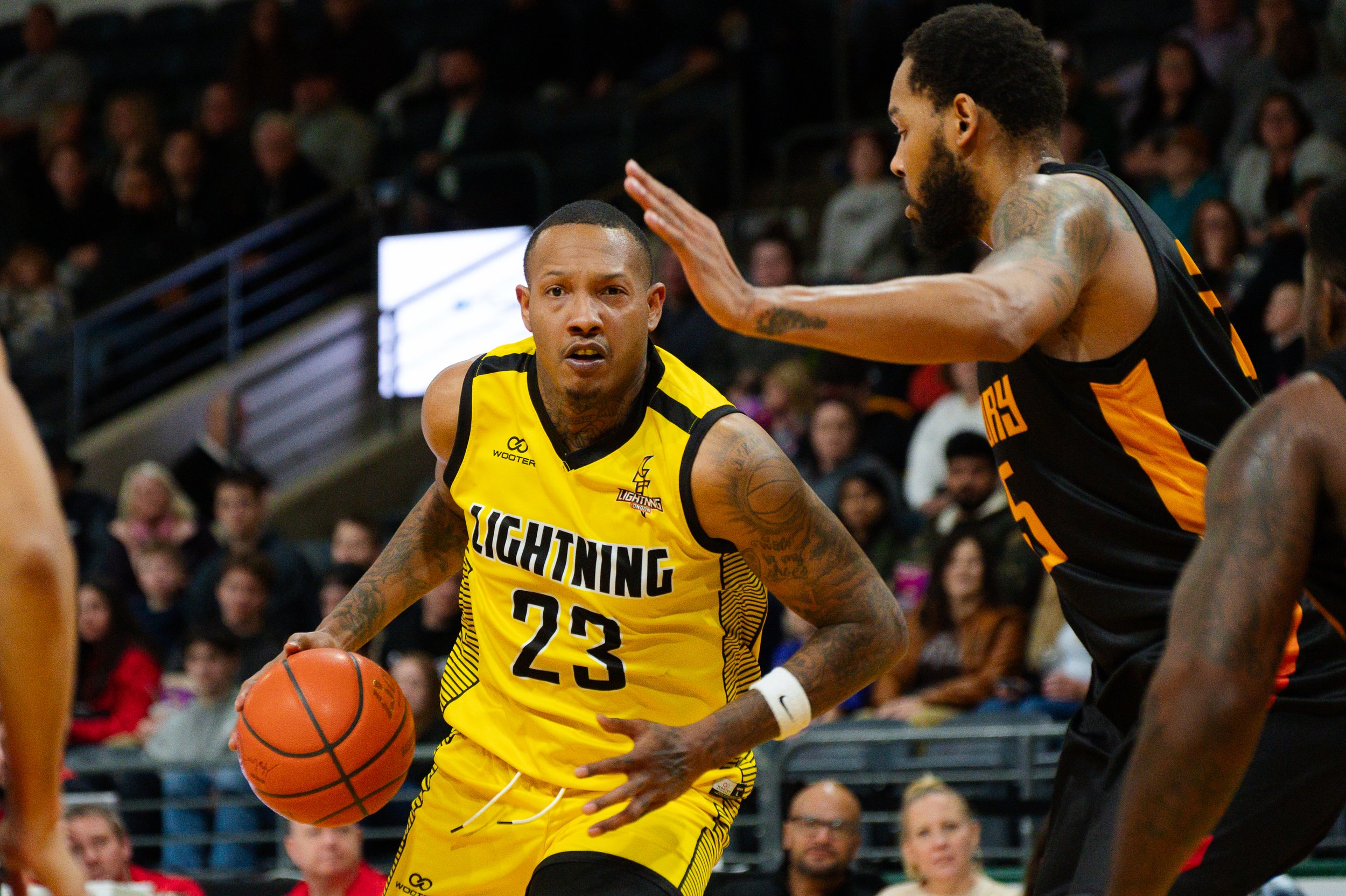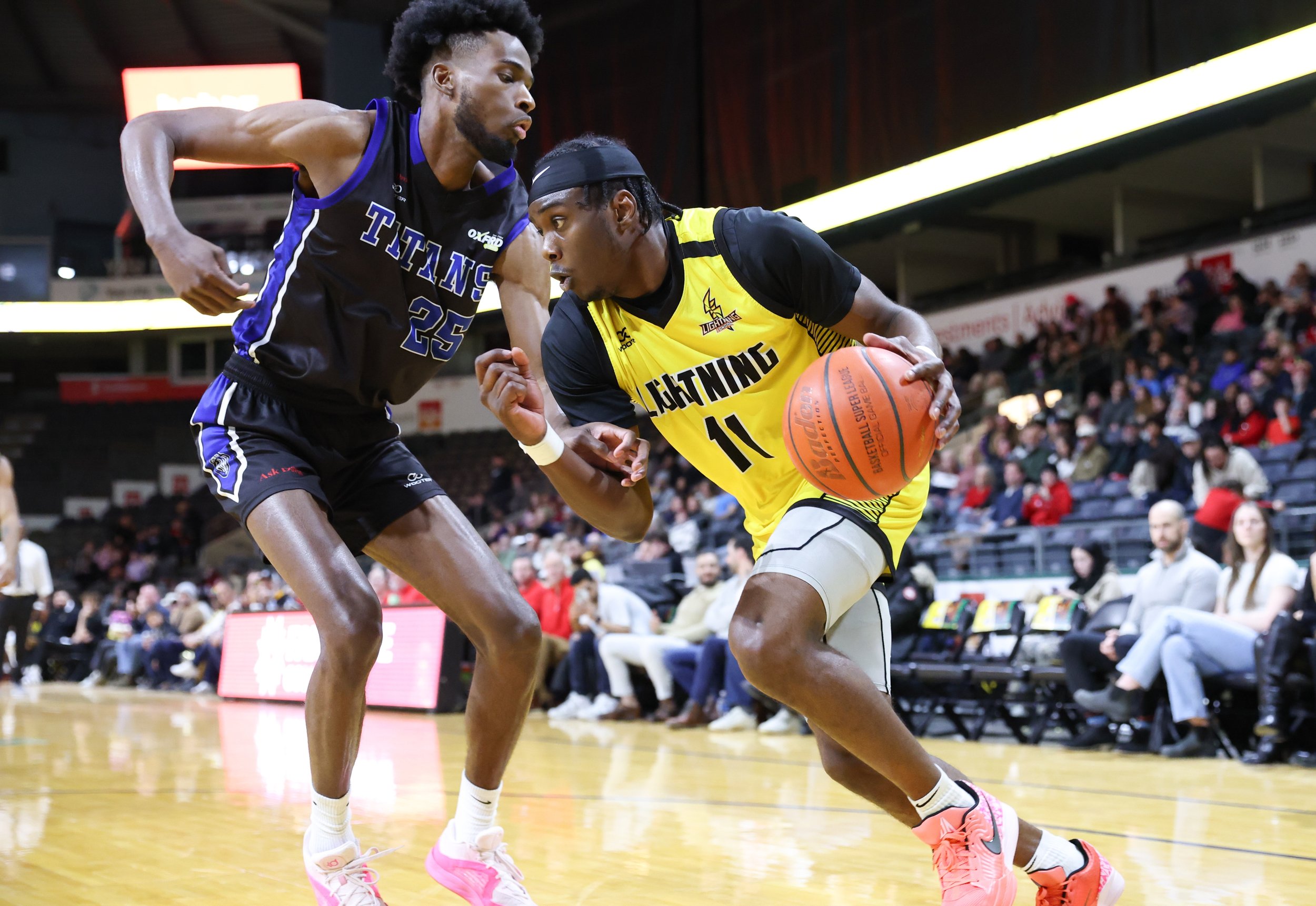The disappearance — and reinvention — of Mo Bolden
Mo Bolden left the Lightning abruptly in Feb. 2020. No one knew how much he was struggling — with the loss of his father, his divorce, and his mental health. He’s in a better place today, and he’s helping youth athletes — on and off the court.
Mo Bolden in action during the 2019-20 season. He spent six seasons in a Lightning uniform. (Photo: Luke Durda).
* * *
He didn’t talk to coaches. Or teammates. Or anyone.
He was just gone.
Two years ago, Maurice Bolden walked away from a game that saved him, a team that needed him, and a community that loved him.
“I just didn’t know what to say. I was hurting. I was confused. I’m a great basketball player. I have played basketball under the worst of conditions. But there was just so much going on at the time,” the former London Lightning forward said. “There were some days I thought I was just going to disappear.”
Today, Bolden has rebounded off the court with a renewed vigor for life, an eye toward lifting up kids in the community and, perhaps one day, a return to the game he loves.
* * *
Maurice ‘Mo’ Bolden was a curious kid growing up in a world that ate up curious kids like him.
“I had a special spirit as a kid, but in the environment I lived in, nobody really cared about that special spirit,” he said. “Where I grew up, you had to be ready for it.”
“It,” in this case, was simply life in Jackson, Mississippi. It would seem trite to recite the tribulations he faced, but safe to say the reality he lived eclipses the one you picture.
“The stuff I got into was just the culture of the place,” he said. “You know, the kind of stuff people consider bad and you go to jail for, well, we thought it was fun. Most people didn’t learn their lesson until something bad happened and they had handcuffs on, or were in jail, or got shot. When those things happen, it turns your life forever.”
His mother, Toya, raised five kids on her own while looking after a handful of others when Bolden’s aunt went to prison. As the oldest of five, Bolden chipped in to help the family, often ditching school to do so.
When a teacher caught Bolden breaking into his school, it broke his mother’s heart. “I was 15. I made a bad decision. I almost lost everything. My mom couldn’t understand it. I didn’t understand it. I remember crying for days, confused.”
But that was life in Jackson. So, he adapted, donning a completely different personality from the kid he knew he was.
“I had to become a lion to survive in the jungle I was living in. I couldn’t be a squirrel. I had to adapt to what was going on. I had to use some tactics that I didn’t agree with, that a lot of people don’t agree with, but those are the tactics you have to use in that environment.”
Manipulation. Intimidation. Cut-throat competition. He isn’t proud of what he resorted to on the streets, at school, or even on the basketball court, but he knew they were keys to survival.
“It was a dog-eat-dog type of world. This might be my friend, and we’re on the same team, and I would love to see him grow with me as a player and go overseas and play pro basketball along with me. But they are only taking one of us from this neighborhood, so I gotta crush him, gotta crush his spirit, gotta compete with him at a high level to the point that when a coach comes down here and says, ‘Who’s the top player in the city?’ everyone points at me.”
That’s one thing he always had – even in his darkest moments.
“Basketball has always been my getaway. That’s how I became so good at it – I worked at it because I knew it would take me places. I was never in it for the money at all. I just wanted to get out of the space I was in. Get out of that mental space; get out of that spiritual space; get out of feeling lost and confused.”
(Photo: Rob Patterson / London Lightning).
* * *
Bolden wasn’t the first in his family to hoop – his mom played ball at Hinds Community College in Mississippi long before Mo was born. In fact, Bolden didn’t discover hoops until Grade 12.
But when he did, he thrived.
Lettering at Jackson Wingfield High School, he led the Falcons to a third-place finish in the Mississippi Class 5A Tournament. The prep all-star averaged 18 points, 12 rebounds, and 3 assists during his career. He was rated as the 18th-best player in Mississippi by MagnoliaPreps.com.
But Bolden needed more than talent to make the jump to NCAA Division I.
He attended Marion Military Institute in Marion, Alabama, in order to academically qualify for university. He hated the experience – so much so that he almost packed up and walked home to Mississippi. But he persevered and thrived.
At Marion Military, Bolden was named first team All-ACCC (Alabama Community College Conference), leading his team to a 21-12 record. He averaged 14.3 points, 7.3 rebounds, and 2.1 blocks per game, recording 10 double-doubles on the year, tops at Marion and fifth in the conference.
In August 2008, Bolden enrolled at Southern Mississippi University. He played three years with the Golden Eagles, leading the team to only its third ever NCAA Tournament appearance in 2012 when they lost to No. 8 Kansas State in the Round of 64.
The 6-foot-10-inch forward then jumped to the professional ranks, eventually playing in Cyprus, Poland, Canada, and the United States. He played seven seasons in the NBL Canada, six with the Lighting between 2013-14 and 2019-20 (bisected by one with the Windsor Express in 2015-16).
In 2016-17, Bolden also joined the Austin Spurs of the NBA D-League, where he averaged 3.2 points, 2.2 rebounds, and .5 assists in 23 games with the San Antonio Spurs-affiliated squad.
“I love for my environment to be a good one. I look forward to being in a hard-working environment, a professional environment,” Bolden said. “Playing for the Spurs helped me figure that out fast. It was very professional about everything – nutrition, how you train your body, how you rest your body. They got it all charted. It was very professional. I brought that mentality back with me.”
There was a lot of excitement about Bolden’s return to the Lightning when he signed in December 2019. In 2018-19, he led the team in points (16.2), rebounds (7.0), and blocks (1.6) per game while also becoming just the sixth player in Bolts history to play 100 regular season games.
“He’s a natural freak,” laughed Bo Parsons, chief trainer for the Lightning and a longtime friend of Boldens. “He’s extremely athletic, agile, smooth, a prototypical professional basketball player. For someone his size, he shouldn’t be able to move so well. He’s a natural athlete. So many guys have to work at it to get to a decent level, but he’s just got it.”
Among the older players on the squad that year, he was a starter, fan favourite, and team leader who understood the franchise’s winning tradition.
“I always liked making my teammates better,” Bolden said of his game. “I really enjoyed seeing them grow. I have the skill set to score every time, but I like to see how my teammates are playing. If somebody is playing good, I want them to have that feeling. I have a great feel for the game.”
Head coach Doug Plumb agreed. “Mo provides versatility and a veteran presence,” he said at the time of the re-signing. “He understands what it takes to win and is at a point in his career where winning is the bottom line.”
The stage was set for an amazing year that never happened. Not for Bolden. Not for the Lightning. Not for anyone.
* * *
It was not the kind of year he expected.
“When I went into the season, I had this drive in me. I wanted to lead the team. There were a bunch of younger guys; Doug (Plumb) was coming back. London is one of those organizations that wants to win the championship every year, so that always gives you some drive,” Bolden said.
“But my mental health started to change. I always kept everything bottled up. I’m one of those guys who felt he needed to be Superman for people.”
His world was collapsing: A car accident. A divorce. A head swimming with the death of his father and unable to travel home to be there for the funeral.
That last one is still tough. Memories of dad are complicated for Bolden.
It wasn’t an easy life – or end – for his dad. Drugs ate away at and then eventually took his life. Bolden has called himself his “dad’s dad,” helping him out with a little cash from time to time. Sometimes his dad ignored him, hurt him, stole from him. But Bolden knew his dad’s desperation was a byproduct of the drugs.
“He was a good guy, a genuine guy,” Bolden said. “I could always talk to him about everything. That’s where I learned to just tell people the truth. He could sit down and talk to me about the truth. You know those conversations you just, like, you keep to yourself? Those conversations where you think you need to figure them out on your own because nobody is going to believe you or people will think you are crazy if you share? I had those conversations with my dad. When he passed away, I didn’t have anyone to talk to like that anymore. I didn’t believe it. It hit me big time.”
Bolden was married at the time, and the death contributed to ending that relationship.
“I lost my spark. I didn’t have any drive anymore. I didn’t have purpose at the time. Nobody would think somebody like myself would go through that. People always see me being strong and playing basketball in the gym three times a day.”
In December, with his mind swimming, Bolden also started to notice something was wrong with his body. He knew something was truly wrong the moment he had to call his coach to say he wouldn’t make practice.
“I don’t miss practice. Ever. I’m always going to practice no matter what – injury, anything. But I just couldn’t get up that day,” Bolden said. “Usually, if I get sick, I go to the treadmill, to the sauna to sweat it out. I go run, go practice, get myself going. But it wasn’t working. I was getting sicker and sicker and sicker to the point I couldn’t walk, couldn’t talk, could barely breathe.”
His partner, Christina, urged him to go to the hospital. Doctors told him he had a lung infection, maybe a throat infection. They gave him some antibiotics. Yet, he ended up in the hospital before recovering.
He would be the first of many Lightning players and staff to fall ill that season. Today, Bolden is sure he had COVID-19 a few months before we started identifying it as such.
When he returned to the team after his bout, he struggled. He couldn’t focus; he couldn’t muster the cardio.
“It was very frustrating. I became very unhappy with how I was playing. I was confused about what my body was going through. When was it going to be over with and I can get my wind back? I was training every day, harder and harder. I am my own biggest critic. I was beating myself up a lot. It became a mental game. I became very unhappy with the taste I was getting from the sport.”
It was frustrating for everyone, including an organization that expected Bolden to be one of its leaders. His silence on his struggles didn’t help his cause, either.
“When you’re playing sports, and you’re not performing, other things could be assumed when you’re not communicating, and they’re not communicating with you properly, and that can cause more friction. So, things got a little touchy around the organization and I decided to stop playing.”
He remembers breaking down film after back-to-back losses to the St John’s Edge and KW Titans. He was unusually – irrationally, even – irritated about a series of play calls.
“Doug is a great coach. I don’t know what was going through my head. I wasn’t feeling my best. I was sick. I had just lost my dad. I was going through a divorce. I was tired. I was gassed out. It was just like a blur to me. A blur.”
Coach asked Bolden to leave the room that day – and then Bolden never returned.
“Nobody understood what I was going through. I was like, ‘Mo, you need to get away fast. You got a lot of built-up energy, and this is how people make bad decisions.’ I went home. I didn’t talk to anybody about it. I was angry. I needed to get out of there. Fast.”
And then he left.
Bolden’s exit shocked the franchise and its fans. Many knew he was struggling, but maybe didn’t realize how much. Teammates went to his house. It was empty. They reached out via text. He didn’t answer.
“Everybody wondered where I went. I just needed to take a break from life,” Bolden said.
“I pride myself on being a strong person today, being able to communicate how I feel with people the right way. But at that time, I wasn’t able to. It was tough. So, I just took a break. I didn’t know how to express it or talk to anybody about it. I didn’t want to say the wrong things about what I was frustrated about at the time.”
He hasn’t spoken to his coach since and that still upsets him.
“Basketball wasn’t the problem. I wasn’t trying to figure out basketball; I was trying to figure out so many other things in my life. Basketball needs to be uplifting for me or I’m not playing. At that moment, it was a hard decision to make because basketball takes me away from all that stuff in my life.”
Basketball was always therapy – bad days chased away by great games on the court. This time, he was hurting off the court, while also struggling on it.
“I started laughing, out of pain. I had to find a way to cope with everything. I wasn’t really talking to anybody. I used to hear some crazy stories when I left the team, crazy stuff people made up. But that’s what happens when you don’t talk to people.”
When Bolden left, the team issued a simple statement on Feb. 21, 2020:
“The London Lightning announce that Mo Bolden has stepped away from the team for personal reasons. For Mo’s privacy no other details will be given at this time and a return date is yet to be determined.”
Bolden with Lightning head coach Doug Plumb. (Photo: Luke Durda).
* * *
Doug Plumb knows the situation could have been better for everyone.
A familiar name to Bolts fans, Plumb served as the team’s assistant coach in 2016-17 before taking over as head coach for the 2019-20 season. He’s the kind of guy who would roll his eyes at being called a hoops savant, so let’s just say he had deep hoops smarts from a young age. But smarts is only half the battle when you’re a young coach.
“This is the challenge, especially being a younger coach. When I first got into this, when I got my first coaching job, I was 30. A lot of times, these (players) had more life experience than I did off the court because I was just so focused on work that I often lost track of what else they were going through and I couldn’t really relate,” he explained.
“I try to always put myself in other people shoes and be sympathetic to what they’re going through. Ultimately, people don’t care how much you know; people care how much you care. Even at the pro level, that rings true.
“Coaching is much less about X’s and O’s and execution; it’s about relationship-building, establishing trust, establishing culture. You gotta get buy-in and trust with the guys; they gotta understand you have their back in all capacities, but then at the same point, you’re expected to perform because it’s a what-have-you-done-for-me-lately business. It’s the all-time balancing act and you do your best. It’s a lot like parenting where nobody really has the answer. All you can do is deal with the information you have on hand and try to make the best decision that’s right for the individual.”
Plumb has a long professional and personal relationship with Bolden. That’s what made the parting so difficult – and its impact linger.
“I knew Mo was going through some stuff at the time, and obviously how it ended was not ideal for either of us. We would have loved to have him around, but sometimes as a coach you gotta make swift decisions. It is what it is. Something that I’ve learned in the last two years through COVID is the importance of extending grace in situations. Everyone’s been through it now, really hard times.”
The pandemic complicated matters, as well. When the world shut down, two weeks turned into two years instantly. There was no reconciliation for Bolden and the team, because there was essentially no team, no league, no season. His decision only magnified. As did the regret.
Because his identity had been wrapped up in basketball, in being a London Lightning player for so long, he was lost.
“My life has been basketball. So, when that was taken away, I didn’t know what direction I wanted to go in.”
(Photo: Don Rycroft / London Lightning).
* * *
Mo Bolden sees himself in these kids. He remembers that desire to compete, to be better. He wants to offer them the hand up he never had as that curious kid with a special spirit growing up in Jackson, Mississippi.
That’s the dream of Lost Files Fitness.
Launched in 2020, Lost Files tapped into Bolden’s love of training, coaching, and teaching. He was already leading and participating in basketball camps in the city, but when the pandemic shut most facilities down, kids were still hungry to train.
Beyond fitness training, the program is also about youth communicating with each other, understanding themselves, gaining confidence, and pushing each other to get better – on and off the court.
“When I came to London, that’s when I started being able to get out of my shell and be the top athlete that I am. But not having that confidence, not simply being able to communicate, that will hold you back,” Bolden explained.
“I try to give these kids that foundation where they can go wherever they want to, they can do whatever they want because people respect them because they have that spirit, they know how to use their voice.”
Bolden’s approach to training incorporates mind, body, and spirit. The program supports around 50 kids. He attends their games, checks on their grades, gets to know their families, and gathers them for outings to bowl or other fun. Anything to build a community.
“It’s like I have a family full of kids,” Bolden laughed.
The Lost Files name comes from the fact that a lot of information gets lost between people when they don’t communicate openly and honestly. Bolden speaks from experience.
“We all try to put on like everything is OK. But these kids need to know that it is OK for everything not to be OK. It’s OK if you’re going through some things,” he explained. “I just tell the truth. The kids listen to the truth. They try hard because of those truths. I tell these kids, if you want to train hard, you believe in yourself, you want to go places, I’m here to help.”
Bolden’s teaching draws heavily on his early days as a young athlete. He was talented, but also unsettled, approaching the game unprofessionally. He needed his peers, his teammates, his classmates, to provide some type of leadership and guidance.
“I cherished those guys. I watched them work. I watched how they carried themselves and how people respected them. I wanted to be like that. I try to be that male role model, that positive role model in the lives of these kids.”
Parsons, a personal trainer and owner of BoFit Studios on Wharncliffe Road, opened the doors of his studio to Lost Files. He believes not only in the program’s mission, but in the man behind it.
“I have met a lot of people who have been through a lot of shit,” he said. “We all have a story. I am real big on telling people I love them. I say, ‘I love you, bro. I hope you’re good.’ The first time I said that to Mo, he looked at me, gave me a hug, and said, ‘I love you, too, bro.’ We had an instant connection then. I think he realized that I understood what he was going through and that I was there for him.”
Early on in their friendship, they met at the studio and talked. There, Bolden told Parsons his life’s story.
“Ever since then, I have been a huge fan of his. I feel like if I ever needed something, he would be there for me. I hope he feels the same. It’s a brotherhood kind of thing.”
When Parsons’ mom died almost five years ago, Bolden was at the funeral even though he’d never met her – nor did he know that she was a huge Lightning fan who worked at the YMCA, where the team practiced.
“When I told him that story (about my mom being a fan), he teared up. I saw that he actually gave a shit – that he cared.”
That’s what Lost Files is all about to Bolden – caring.
* * *
It seems like Mo Bolden has found peace.
After so long in the Forest City, it might seem odd to say that he’s building a life here – so, let’s say he is reorienting it. That’s a huge task for a man defined for so long for his exploits under the lights on the basketball court.
But he has a lot of support on his home team.
Christina has been his “rock, a crazy inspiration. She has always had my back. She has always given me reassurance. I’m a very confident person, so I don’t really break down much, but she has seen the majority of them. To be able to get that out there, I’m just so happy to have her on my side and be able to talk to her.”
The couple are raising two little ones at home in London, a 9-year-old son and 6-month-old daughter. Additionally, Lost Files keeps him involved in a growing family of kids from across the community.
“London is home,” he said. “I love it here.”
Two years removed from his last game, Bolden’s Lightning memories are strong – and positive.
“I gave my all to the organization. I will continue to do so,” he said, noting how Lightning owner Vita Frija has always treated him like family. “They helped me take care of my family financially. They put me in a good situation. I found my girl here; my son is living here now with my daughter; I meet nice people all the time. It’s all because the Lightning gave me the opportunity to come and play here. I didn’t know it was going turn into all this. For me, there was never any disrespect meant.”
He likes where his life is today.
“I want to focus on my family, build my brand, focus on these things as much as I can and see where it goes. The pandemic scared everybody. You need to have something going for yourself. I did things I never thought I would do – construction, truck driving, selling shoes at Nike. I just tried on stuff just to see what I like and don’t like.”
With the NBL Canada season two weeks in, he remains unsigned by any team.
Last year, he played in the Skinz League, a summer basketball league that features amateurs, overseas professionals, and NBA players in Oklahoma City, Oklahoma. But he hasn’t played a professional league game since he left the Lightning.
With no lingering effects of his COVID bout, Bolden continues to stay game-ready – “I have a drive in me. I know how to put myself in shape.”
He’s had opportunities to go and play again, but his heart is here with his family and the Lost Files kids. Now 32, he doesn’t feel the need to go prove himself on the courts of the world. Closer to home opportunities? Perhaps.
“It has been a journey. But I have embraced it. It’s my life. That’s the way it went. I gotta take the good from it and use the bad as fuel to be able to give back,” Bolden said.
“If I get a chance to get back in that tunnel, I’m gonna get emotional. When I left last time, I didn’t see it happening again. I didn’t see anything. I didn’t know where I was going. I just saw a dark tunnel. But I kept walking forward, thinking hopefully some light would pop up soon. I just kept walking and didn’t quit. That’s my mentality, and even though I was down, I kept my feet walking. Stuff was happening, but I told myself to keep walking, that some light would pop up somewhere. I found that light. I’m back.”













Knight Watch: After sweeping Owen Sound, London takes on the No. 5 Erie Otters in the second round of the OHL playoffs; Columnist Jake Jeffrey previews the matchup — and predicts the rest of the OHL series …